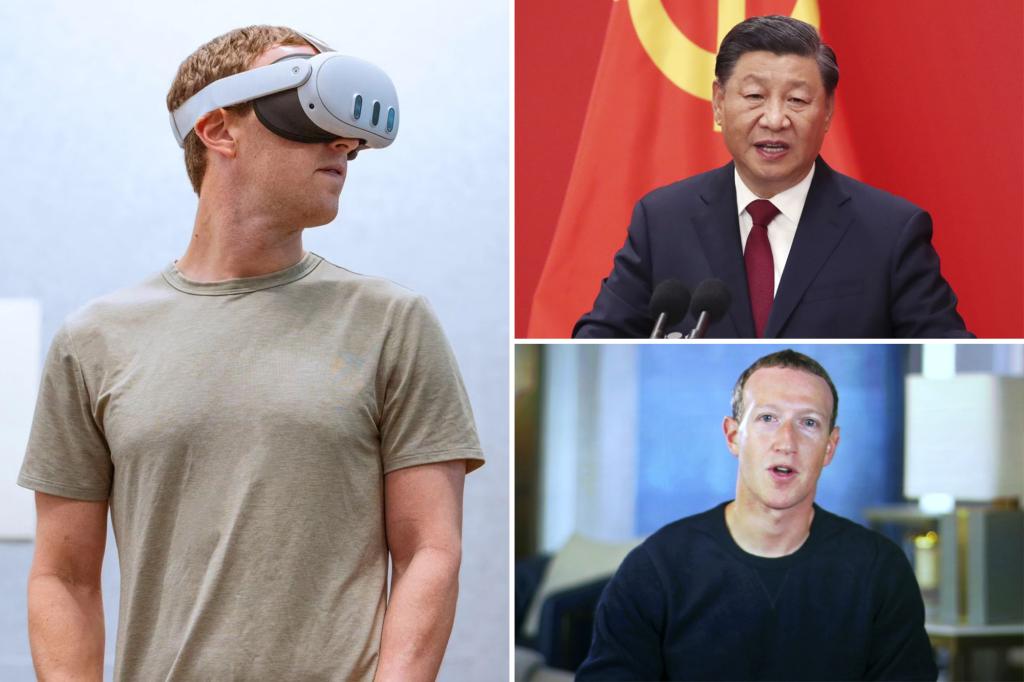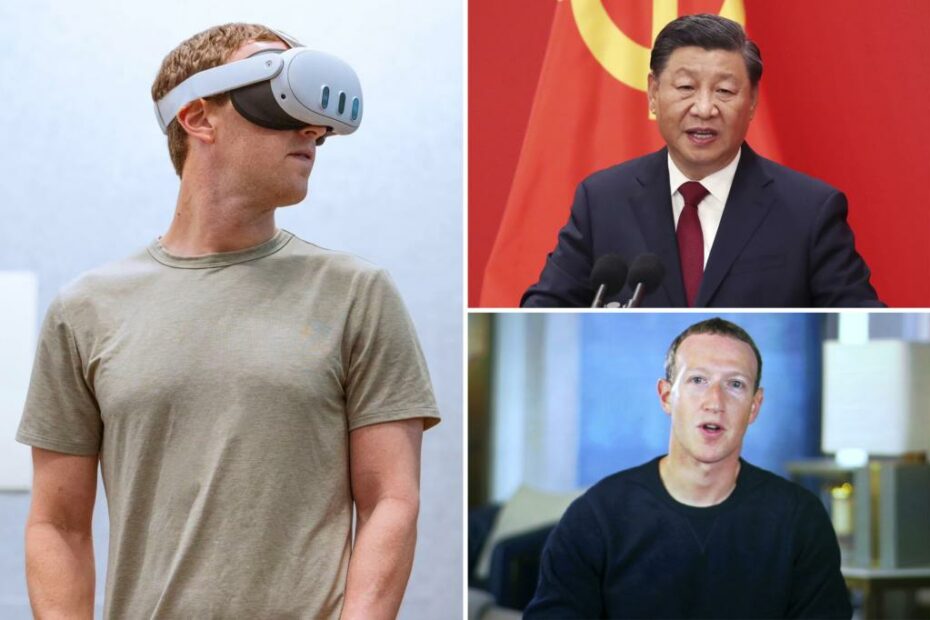China resists Mark Zuckerberg bid to sell Quest headsets: report
Meta CEO Mark Zuckerberg is facing obstacles in bringing his virtual reality headset, Quest, to the Chinese market due to his past criticisms of the Communist-run government. The Wall Street Journal reports that Zuckerberg and other Meta executives have reached out to Tencent Holdings, a Chinese tech company, to discuss a potential partnership. However, business leaders in China are wary of collaborating with Zuckerberg due to his previous accusations against the government and criticism of rival platform TikTok.
Zuckerberg has accused the Chinese government of enabling businesses to steal technology and has expressed concerns about TikTok’s threat to American values and free expression. These criticisms have had a lasting impact on how Beijing officials perceive Zuckerberg and could complicate the process of obtaining licenses and approvals for Meta’s products and services in China.
This struggle to enter the Chinese market comes after Facebook and its sister platforms, Instagram and WhatsApp, were effectively banned in China in 2009 for refusing to comply with the government’s censorship demands.
Zuckerberg’s outreach to Tencent may be driven by Apple’s recent entry into the metaverse. Apple recently unveiled its Vision Pro augmented reality headset, which carries a price tag of $3,499, three times higher than Meta’s priciest headset. Meta’s flagship VR headset, Meta Quest Pro, is currently priced at $999.99, down from its original launch price of $1,499.99. The Quest 2 is being sold for $299.99.
In an effort to expand his company’s presence in China, Zuckerberg has engaged in talks with Tencent about a potential partnership to market Meta’s VR headsets. However, the outcome remains uncertain, given the tensions caused by past criticisms and accusations made by Zuckerberg.
FAQs:
Q: Why is Meta CEO Mark Zuckerberg struggling to bring his Quest headsets to China?
A: Zuckerberg’s past criticisms of the Communist-run Chinese government and his accusations that businesses in China steal technology have made business leaders in China hesitant to partner with him.
Q: What impact could Beijing officials’ perceptions of Zuckerberg have on Meta’s entry into the Chinese market?
A: If Meta and its partner seek licenses and approvals for their products and services in China, the negative perceptions of Zuckerberg could introduce uncertainty and complications in the process.
Q: Why does Zuckerberg’s outreach to Tencent relate to Apple’s entry into the metaverse?
A: Apple’s announcement of the Vision Pro augmented reality headset, which comes at a higher price than Meta’s headsets, may have prompted Zuckerberg to seek a partnership with Tencent in order to compete in the Chinese market.
Q: How have Zuckerberg’s criticisms affected his ability to enter the Chinese market?
A: Zuckerberg’s criticisms of the Chinese government and his concerns about TikTok have influenced how Beijing officials perceive him, making it more challenging for Meta to establish a presence in China.
Q: Why did Facebook, Instagram, and WhatsApp get banned in China?
A: In 2009, these social media platforms were banned in China after refusing to comply with the government’s censorship demands.
Q: How has Meta adjusted the prices of their headsets?
A: The flagship VR headset, Meta Quest Pro, has been reduced in price from $1,499.99 to $999.99. The Quest 2 is currently being sold for $299.99.

Report states that China rejects Mark Zuckerberg’s attempt to sell Quest headsets
Meta CEO Mark Zuckerberg is reportedly facing challenges in selling his Quest headsets in China as a result of his past criticisms of the country’s government. The Wall Street Journal has revealed that Zuckerberg and other executives from Meta have reached out to Tencent Holdings in an attempt to bring their virtual reality headset to the Chinese market, which boasts a population of over 1.4 billion people. However, Chinese business leaders seem reluctant to form a partnership with Zuckerberg due to his previous accusations that the government allows technology theft and his criticism of rival video-sharing platform TikTok.
According to sources familiar with the matter, Beijing officials’ perception of Zuckerberg could create uncertainty should Meta and Tencent try to obtain licenses and approvals for their products and services in China. The Journal has sought statements from both Meta Platforms Inc and Tencent but has not received any response.
Facebook, Instagram, and WhatsApp have been effectively banned in China since 2009 after the social media platforms refused to comply with the government’s censorship demands. It appears that Zuckerberg’s recent outreach to Tencent may be motivated by Apple’s entrance into the metaverse, which Zuckerberg has dominated. Last week, Apple unveiled a $3,499 augmented reality headset called the Vision Pro, which is three times more expensive than Meta’s priciest headset.
Meta’s flagship VR headset, Meta Quest Pro, is currently priced at $999.99, down from its launch price of $1,499.99, while Quest 2 is being sold for $299.99, according to Meta’s website. In an effort to make a bigger impact in the metaverse market, Meta reduced the prices of its headsets in March after its ambitious bets failed to attract significant attention.
The report states that Zuckerberg has been engaging in discussions with the Chinese technology company Tencent to potentially establish a partnership in order to market Meta’s VR headsets. In 2021, Zuckerberg expressed his confusion as to why American tech giants such as Tesla and Apple are allowed to sell their products freely in China while Facebook is excluded from the Chinese market.
Zuckerberg has also criticized TikTok’s parent company, ByteDance, which has posed a threat to Facebook’s user base. In 2019, he spoke at Georgetown University, stating that TikTok does not share Facebook’s commitment to free expression and raises concerns about American values.
Moreover, Zuckerberg is said to have personally lobbied former President Donald Trump and lawmakers on Capitol Hill about the potential risks posed by Chinese tech companies to American businesses. He has claimed that the Chinese government steals technology from American companies and has been critical of Chinese tech firms in the past.
Last year, it was revealed that Meta hired a prominent Republican consulting firm to generate animosity towards TikTok and divert political scrutiny away from Facebook and Instagram. TikTok’s Chinese corporate parent, ByteDance, has faced significant scrutiny from lawmakers due to its ties to the ruling Communist Party in Beijing. Both TikTok and ByteDance have consistently denied allegations that they collect American users’ data on behalf of the Chinese government.
In conclusion, Mark Zuckerberg’s efforts to sell Meta’s Quest headsets in China have hit obstacles due to his previous criticisms of the Chinese government and Chinese tech companies. His outreach to Tencent is seen as a possible attempt to counter Apple’s entry into the metaverse market. Zuckerberg’s comments about TikTok and Chinese tech firms, as well as his claims of technology theft by the Chinese government, have raised concerns among Chinese business leaders and officials.
